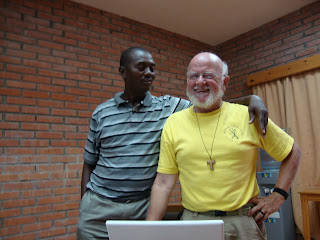The team is working with material in part developed by the Mennonite John Paul Lederach, a US Mennonite, some of which can be found in workbooks prepared by Caritas and Catholic Relief Services, as well as in some books he’s published.Both the two modules I attended have been helpful, though I am not sure exactly how to integrate this knowledge into practice.
A couple of things struck me. First of all, it’s not about resolution of conflicts. It’s about transformation of conflicts. Therefore, peace and reconciliation are not separated from the struggle for justice.
Secondly, in this last module, I began to see that dealing with conflict is not only dealing with issues but with relationships. Often there are important issues but in dealing with conflicts dealing with relationships between parties is essential, though, I believe, not the only issue. I tend to be an "ideas/concepts" person - and so our work on this is helping me to find ways to work through the relationships aspects of conflicts.
During the workshop the facilitators shared a video, “As it is in heaven,” a Swedish film, dubbed and subtitled in Spanish. It’s a unique film that touched me and many others in the workshop. But what hit me was a scene near the end where Daniel, a famous conductor who ended up moving back to his birthplace, meets his agent as he brings a group from his home town to a music competition. (I won’t write more so that I don’t give the plot away.) But his agent asks Daniel, “Why with these people?” Daniel’s response touched my heart, “They love me and I love them.” That’s why I stay here! As we related the film to our workshop, I shared this and stop the tears. I recommend the film.
An extra advantage of this workshop was the chance to get to know Caritas workers from other parts of the country and to hear of their work, as well as learn of what is happening throughout the country.

I really enjoyed time with Leonardo, a Garifuna, who grew up in the Mosquitia and speaks Mosquite, Garifuna, Spanish, and a little English. Ramon, Moncho, from Olancho loved to bug me with his continual jokes – some a bit ribald.
We also had two nights of just plain fun - including karaoke, jokes, and cultural sharing.

There was lots of time for serious discussion and group work about conflict and peacebuilding - using a wide varieties of pedagogical methods.
But I really enjoyed just talking with folks. What did I learn of what’s happening throughout the country.
In the Mosquitia, the people of one municipality rose up and threw out the mayor, because of his corruption. Probably about 90% of the people supported the effort and it seems that there was no outside support or advice. The power of the people.
We spent some time one day talking about conflicts that the various diocesan Caritas offices were dealing with. Of the 8 offices, 3 shared conflicts over water. Will this be a major issue in the coming years – whether it be groups seeking to erect dams for electrical projects, access to water, or control of water resources?
Several people talked about the continuing problem of land tenure in Bajo Aguan in Colón and in other parts of the country – and the concerns about the concentration of land in the hands of a few who often have the military (as well as paramilitaries) working with and for them.
Water and land – two serious concerns. Two concerns addressed strongly in Catholic Social Thought. But more important two issues that affect the lives of the poorest here.
More later. I'm back in Santa Rosa after traveling yesterday two hours in car and almost four hours in bus! But I have my car - ready and raring to go!




No comments:
Post a Comment